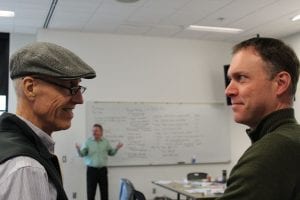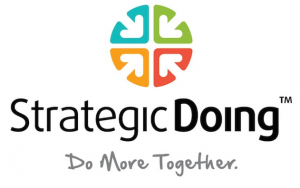By Bob Parker
For the past 18 months, we’ve partnered with the Chehalem Valley Innovation Accelerator (CVIA) to bring the Strategic Doing framework to Yamhill County. The intent is to train a core group of Strategic Doing practitioners who are then available to help communities and organizations work on pressing issues. We’ve run many workshops to date: the Yamhill County Arts Alliance, rebooting tourism marketing, homelessness in McMinnville to name a few. The ultimate objective is to develop “The Collaborative” a group of dedicated volunteers that are making things happen in Yamhill County. The effort is funded through a grant from The Ford Family Foundation. 
Last March we trained the Yamhill County Seven with assistance from our colleagues at Purdue University’s Agile Strategies Lab. The team at Purdue developed the Strategic Doing framework. We’ve latched onto it and are now an affiliate campus that can provide trainings.
Carr Biggerstaff, Chief Wrangler at CVIA did the lions share of recruiting participants to the training. We ultimately had 16 participants in our first Strategic Doing practitioner training. By our measures, the training went quite well. We’ll follow up in the near future by running the group through practice workshops. We’re very excited about the direction the collaboration is taking and the promise of the Strategic Doing framework to move people from conversation to action.


